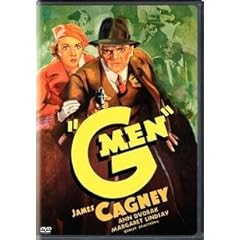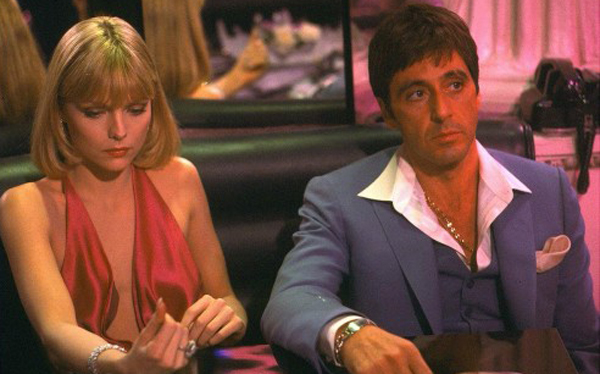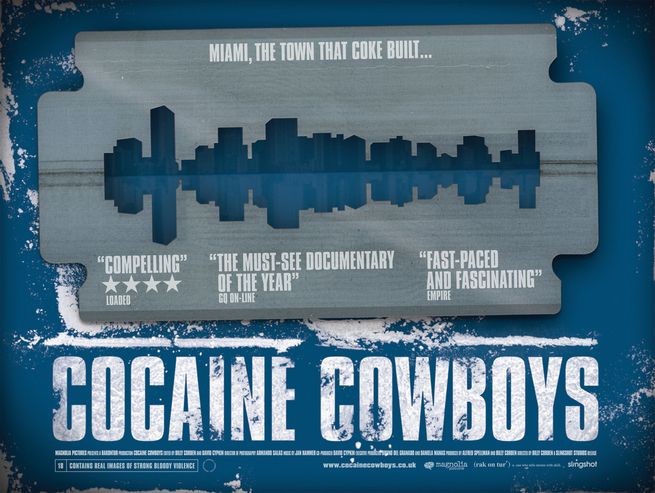PART 1
The Classic Gangster Era
It was pretty hard to beleive in the "rags to riches" myth of equal opportunity in Depression-era America. For the first time, many middle class Americans figured out that hard work and determination didn't necessarily mean you were going to move up in the world. Of course, the working class already knew that. One of the few kinds of people actually going from rags to riches in the 1930s were gangsters, whose small territories grew into large empires of bootlegging, racketeering, the drug trade and prostitution. Not surprisingly, people started looking at these guys as shining lights of inspiration, rebellious anti-establishment heroes. Must haves from this era:
The Public Enemy (1931)
 Scarface (1932)
Scarface (1932)  Little Ceasar (1931)
Little Ceasar (1931)  Reasoning: Star power - James Cagney, Paul Muni and Edward G. Robinson are amazingly intense and thus set themselves up as archetypal gangster characters we still see today. All three of these met with controversy, but Scarface, the Howard Hughes film, is one that you definitely need to own. If anything, get it just to see how closely it was adapted to the 1983 version. And don't tell me you don't like old movies. These are different. I promise.
Reasoning: Star power - James Cagney, Paul Muni and Edward G. Robinson are amazingly intense and thus set themselves up as archetypal gangster characters we still see today. All three of these met with controversy, but Scarface, the Howard Hughes film, is one that you definitely need to own. If anything, get it just to see how closely it was adapted to the 1983 version. And don't tell me you don't like old movies. These are different. I promise.Post-Code Gangster Films
After the studioes started to self-censor via the Production Code (aka the Hays Code), the gangster film was severely handicapped. They couldn't make a hero out of the gangster, so they had to make sure cops and other people in authority were shown to be the true heroes. But they didn't want to give up on the violence and intensity that the gangster brought to the story (and to the profits). Hence these two options:
G-Men (1935) - where the Jimmy Cagney plays a cop just as psycho as the gangsters he previously played.

Angels with Dirty Faces (1938)- one of my favorites, where (again) James Cagney plays a gangster with important ties to his past. The last ten minutes illustrate why Cagney was so often chosen for these roles, and how the studios cleverly got around the Code.

Film Noir Gangster
During WW2, films mostly focused on the new evil, the Axis forces. Even gangster films like Lucky Jordan and All Through the Night were mostly gangsters vs. Nazis (the real enemy). But
Key Largo, a noir film, really showed how disillusioned the country was after the war. Excellent work by Humphrey Bogart, but also from Edward G. Robinson, who played a gangster who was trying to get back his former glory, and failing. Not to mention Lauren Bacall, who put an important foot forward for women in gangster films. Though she rules most in To Have and Have Not.

The Film that Killed the Code
Bonnie & Clyde

After a bunch of heist films in the 50s where the gangsters were often low-level and didn't have much power, the 1960s reintroduced the traditional gangster with the biographical gangster film, and Bonnie & Clyde was a bloody, bloody film that showcased the central characters almost heroically fighting the establishment. I think the scene where they are shot a thousand times is when the studios decided something like the MPAA would be a good idea.
Gangster Film Renaissance
The Godfather Trilogy

Like, no duh, you need to watch at least The Godfather I & II. The third you can watch, but don't feel obligated to own it even though it's a trilogy. Not only did it reinvigorate the genre and make it classy, it provided a revisionist history as well. No story before it quite captured how difficult immigrants who eventually became gangsters had it in America, and how sometimes the gang provided protection, support, and a way to acheive some semblance of the American dream denied to people of a certain color or background.
Scarface (1983)

Just go buy it, OK? It is bloody, freaky (with Tony's whole obsession with protecting his sister), and Al Pacino's attempt at a Cuban accent is just priceless. It stays true to the message of Hughes' original, while at the same time bringing to light the hypocrisy of the establishment. And it is yet another interesting discussion of the limitations facing immigrants in the Reagan era.
For more on that, you should make a night of it and rent, or better yet, BUY the documentary Cocaine Cowboys, that explores the history of that era in Miami.

They manage to interview key players in the drug trade in Miami in the 1980s, including gang enforcers, major dealers, and the FBI/police officers trying to figure out what the hell was going on. Lots of information about the connection between Miami and the Medellin cartel, but not so much on Pablo Escobar (who hogs all the glory in other docs). I rarely watch documentaries over and over, but this is one of the few that has been replayed. Also, it spends quite a bit of time on a little known key player, La Madrina, the Godmother, Griselda Blanco. Even putting her name in this blog kinda scares me, because if she's still alive and Googling, she could find me. She's scary as hell. I hope they make a movie about her life. That's a ganster film I'd definitely want in my collection.

Goodfellas (1991)
 Goodfellas is the best film in the history of film. Don't even argue with me, because it just is. Amazing score, amazing dialogue, amazing story, Scorcese's genius. Get my drift? It shows quite convincingly why people were attracted to the gangster lifestyle, but more importantly (at least for me), it shifts the narration from the central character, Henry Hill (the gangster) and his wife, Karen. So we get a picture of what life is like for him, but for her as well . Excellent acting all the way around.
Goodfellas is the best film in the history of film. Don't even argue with me, because it just is. Amazing score, amazing dialogue, amazing story, Scorcese's genius. Get my drift? It shows quite convincingly why people were attracted to the gangster lifestyle, but more importantly (at least for me), it shifts the narration from the central character, Henry Hill (the gangster) and his wife, Karen. So we get a picture of what life is like for him, but for her as well . Excellent acting all the way around.Next time:
West Coast gangsters represent, Christopher Walken, TV shows like Gang Nation, and Daniel Day Lewis' sexy version of the probably very stinky and grody Bill "The Butcher" Cutting. Oh, and don't forget Tony Soprano!
No comments:
Post a Comment